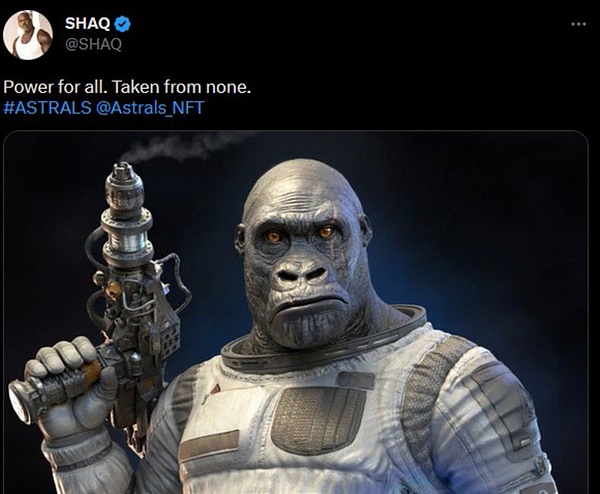
In recent years, the rapid expansion of the Web3 field has not only brought about the integration of technology and finance, but also triggered a wave of legal supervision worldwide.From the craze of NFT projects to the fact that Dogecoin is being pushed to the peak of topics, blockchain celebrity projects have been constantly entering the public eye.However, behind these shines, the shadow of compliance and law is approaching.Recently, former NBA superstar Shaquille O’Neal faced class action lawsuits for promoting NFT projects Astrals and Galaxy tokens, once again reveals to us the complex legal risks in the Web3 world.This article will dig deep into the legal issues behind this case and explore the compliance challenges celebrities may face when pushing the cryptocurrency space.
1. O’Neill Case: Settlement Agreement and Undefined Legal Boundaries
This year, Shaquille O’Neal faces a class action lawsuit in Florida federal court for actively promoting Astrals NFT and Galaxy tokens on social media.According to public court documents, O’Neal and the company behind Astrals have agreed to pay $11 million for settlement, the amount that will be used to pay plaintiffs’ attorney fees and to compensate affected NFTs and token buyers.While the settlement resolves the immediate risks of litigation, it also brings us to a deeper level of problem:Do these NFTs and tokens actually belong to securities?

Applicability of U.S. Securities LawStill the focus of such cases.Under the Securities Act 1933, any investment contract involving public capital investments and expected to be profitable by others’ efforts may be considered a securities.In the Astrals case, are investors buying NFT or Galaxy tokens for financial returns?Did O’Neal and the project party fail to clearly disclose the risks of the project during the promotion?The answers to these questions directly affect the legal status of NFTs and tokens.However, the conclusion of the settlement agreement means that the issue has not been decided by a judicial system, but ends with a compromise between the two parties.In this way, the law’s definition of whether NFTs belong to securities remains pending, which also lays uncertain risks for similar projects in the future.
2. Legal and moral responsibility for celebrity endorsement
The phenomenon of celebrities endorsing cryptocurrency projects is not new, but in recent years, it has beenKim KardashianSimilar actions by well-known figures have been fined, which has attracted widespread attention from the public and regulators.For celebrities, the promotion of cryptocurrency and NFT projects is both an opportunity and a trap: on the one hand, they have made the project widely exposed with their huge influence, attracting a large number of investors; on the other hand, if these endorsed projects are compliantRisk, then these spokespersons may face allegations of market manipulation, misleading publicity and unregistered securities.
In O’Neal’s case, the Florida class action lawsuit alleges that it failed to clearly state the risks in the promotion and even intended to mislead the public.While the settlement avoids direct legal penalties for O’Neal personally, it still sounds a wake-up call for all celebrities and project parties involved in the Web3 field.For those seemingly glorious promotional activities, if there is a interest relationship behind them and they are not disclosed truthfully, celebrities will face compliance responsibilities and a serious crisis of public trust.
3. Does Musk have the same risks as Dogecoin?
Similar to O’Neal, Elon Musk has attracted widespread attention for his frequent promotion of Dogecoin on social media.As one of the most influential figures in the world, Musk’s tweets can directly influence the price fluctuations of cryptocurrencies.In 2023, Musk was accused of market manipulation by some investors of volatility in Dogecoin and filed a class action lawsuit.However, unlike Astrals and Galaxy tokens,Dogecoin itself is regarded more as a payment tool than a securities, so it does not meet traditional securities standards in legal determination.
Risks of market manipulationAlways exist.When celebrities publish content that could affect investment decisions, regulators will closely monitor whether they have subjective motivations to manipulate the market, especially in the Pump and Dump mode.Celebrities’ public support for a cryptocurrency on social media is likely to face allegations of market manipulation if they are found to sell their positions to make a profit.Although Musk talks about Dogecoin from the perspective of humor and personal interests, his words and deeds undoubtedly set a case reference for future supervision.Especially at the moment when the government is in a key position.Aiying has written similar articles before, please read “How can Musk escape unscathed in the face of Dogecoin market manipulation and insider trading accusations?》
4. The futureCompliance Outlook: Going to the Deep Waters of Regulation
NFTs and cryptocurrencies have attracted a large number of investors over the past few years for their innovativeness and potentially high returns, but have also been criticized for their lack of regulation.The Securities and Exchange Commission (SEC) allegations against multiple NFT projects show regulators are gradually increasing their scrutiny of the industry.I have written about the previous article “Can Trump’s re-election bring real regulatory breakthroughs to the crypto industry?》It has been mentionedAlthough the regulatory environment may be more flexible, it does not mean that crypto companies can completely escape the shackles of the law, especially those projects that still have centralized characteristics that may still face rigorous scrutiny.
In the future, Web3 project parties must invest more energy in compliance, especially projects related to public investors.If a token or NFT is deemed a securities, its issuance must comply with the provisions of the Securities Act, including registration requirements and transparent disclosure.For celebrity spokespersons, promoting any Web3 asset requires careful review of its compliance and avoid legal liability for failing to disclose business relationships or potential benefits.
Case link: https://storage.courtlistener.com/recap/gov.uscourts.flsd.647550/gov.uscourts.flsd.647550.1.0.pdf








